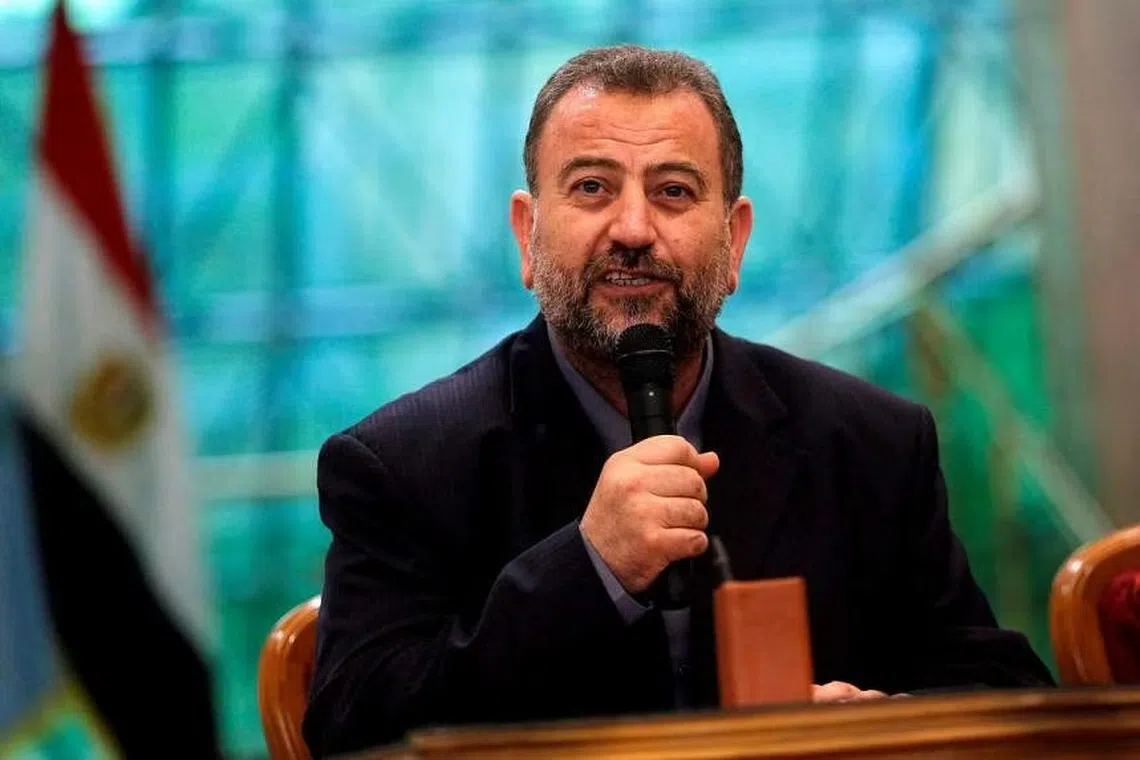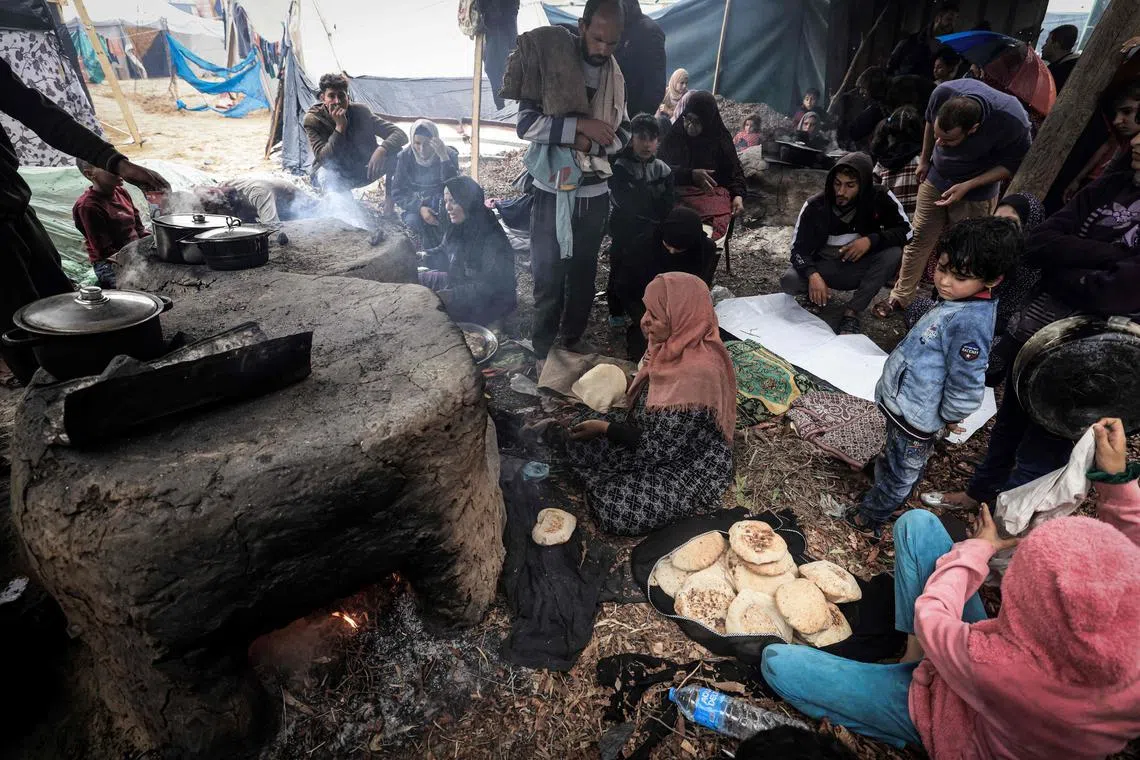Gaza war extends into Beirut with killing of Hamas leader
Sign up now: Get ST's newsletters delivered to your inbox
Follow topic:
BEIRUT/CAIRO/GAZA – Israeli forces intensified their bombing of the Gaza Strip on Jan 3 and told civilians to leave a refugee camp in the north of the enclave, after the war stretched into Lebanon with the killing in Beirut of Hamas’ deputy leader.
Mr Saleh al-Arouri was killed in a drone strike in the Lebanese capital on Jan 2, said Lebanese and Palestinian security sources.
Israel has neither confirmed nor denied that it killed Mr Arouri. But military spokesman Rear-Admiral Daniel Hagari said Israeli forces were in a high state of readiness and were prepared for any scenario.
The assassination was a further sign that the war between Israel and Hamas was spreading across the region, drawing in the occupied West Bank, Hezbollah forces on the Lebanon-Israel border and even Red Sea shipping lanes.
Mr Arouri, 57, who lived in Beirut, was the first senior Hamas political leader to be assassinated
Hamas politburo member Hossam Badran said in a eulogy for Mr Arouri: “We say to the criminal occupation (Israel) that the battle between us is open.”
Israel had long accused Mr Arouri of orchestrating attacks on its citizens.
But a Hamas official said he was also “at the heart of negotiations” conducted by Qatar and Egypt over the outcome of the Gaza war and the release of Hamas-held Israeli hostages.
Hezbollah leader Hassan Nasrallah was due to make a speech in Beirut on the afternoon of Jan 3. Previously, he had warned Israel against carrying out any assassinations on Lebanese soil, vowing a “severe reaction”.
The heavily armed Hezbollah group, a Hamas ally, has been exchanging near-daily fire with Israel across Lebanon’s southern border since the war in Gaza began.
More than 100 Hezbollah fighters and two dozen civilians have been killed on Lebanese territory, as well as at least nine Israeli soldiers in Israel.
Following Mr Arouri’s killing, the United Nations peacekeeping mission in Lebanon said it was deeply concerned about the possibility of an escalation “that could have devastating consequences for people on both sides of the border”.
‘Waiting for martyrdom’

Saleh al-Arouri was a co-founder of Hamas’ military wing, the Qassam Brigades, which carried out the Oct 7 deadly assault on Israeli territory.
PHOTO: REUTERS
Israel had accused Mr Arouri, a co-founder of Hamas’ military wing, the Izz-el-Deen al-Qassam Brigades, of ordering and supervising Hamas attacks in the Israeli-occupied West Bank for years.
“I am waiting for martyrdom (death) and I think I have lived too long,” Mr Arouri said in August, alluding to Israeli threats to eliminate Hamas leaders, whether in Gaza or abroad.
Mr Nasser Kanaani, a spokesman for the Foreign Ministry of Iran, a major supporter of Hamas and Hezbollah, said Mr Arouri’s killing would “undoubtedly ignite another surge in the veins of resistance and the motivation to fight against the Zionist occupiers, not only in Palestine but also in the region and among all freedom-seekers worldwide”.
Hundreds of Palestinians took to the streets of Ramallah and other towns in the West Bank to condemn Mr Arouri’s killing, chanting: “Revenge, revenge, Qassam!”
Iranian-backed Houthi rebels in Yemen have vowed to continue their attacks on shipping in the Red Sea until Israel halts the conflict in Gaza, and warned that it would attack United States warships if the militia group itself was targeted.
Houthi militants fired two anti-ship ballistic missiles into the southern Red Sea, though no damage was reported
The United Kingdom Maritime Trade Operations authority reported up to three explosions near a merchant vessel in Bab al-Mandab Strait, east of Eritrea’s Assab, with no reports of damage.
The US has announced an international maritime task force
Refugee camp under fire
In Gaza, Israeli forces bombed Al-Nuseirat refugee camp in the northern part of the Hamas-ruled enclave overnight and into Jan 3, destroying several buildings, residents and Palestinian media said.
Israeli planes also dropped leaflets on Al-Nuseirat ordering people to leave seven districts.
“You are in a dangerous combat area. The IDF is operating heavily in your area of residence. For your safety, the IDF urge you to immediately evacuate this area and leave towards the known shelters in Deir Al-Balah (west),” the leaflets said.
Israeli warplanes and tanks also stepped up attacks on the Al-Bureij refugee camp.
Hamas’ armed wing said it killed 10 Israeli soldiers in fighting in Al-Bureij and hit five tanks and troop carriers. The Israeli military said the number of its soldiers killed since its first incursion into Gaza on Oct 20 had reached 177.
In the Al-Maghazi refugee camp, health officials said at least four people were killed in an Israeli air strike on a house. They said three people were also killed in an air strike on a house in Rafah in the south of the Gaza Strip.
Israel says it tries to avoid harm to civilians. But at least 22,000 people have been killed in the enclave, with 128 of them in the past 24 hours, the Gaza Health Ministry said on Jan 3.
The Gaza war was triggered by an assault by Hamas on Israeli towns
Since then Israeli bombardments have laid waste to much of the enclave. Its 2.3 million residents are engulfed in a humanitarian disaster in which thousands have been left destitute, crammed into shrinking areas in the hope they are safe and threatened by famine due to a lack of food supplies.
The Israeli targeting of Gaza City’s Al-Shifa Hospital in November stoked global alarm over the fate of civilians and patients who were inside.
Israel said Hamas used tunnels beneath the hospital as a headquarters and was using its patients as shields.
US spy agencies assessed that Hamas and Islamic Jihad had used Al-Shifa to command forces
Hamas responds to ceasefire proposal
Shortly before Mr Arouri’s killing, Hamas’ paramount leader Ismail Haniyeh, who is also based outside Gaza, said the movement had delivered its response to an Egyptian-Qatari ceasefire proposal.
He reiterated that Hamas’ conditions entailed “a complete cessation” of Israel’s offensive in exchange for further releases of hostages.
Israel believes 129 hostages remain in Gaza after some were released during a brief truce in late November,
Israel has vowed to keep fighting until it has wiped out Hamas, but it is unclear what it plans to do with the enclave should it succeed and where that leaves the prospect of an independent Palestinian state.

Palestinian women making bread in ovens at a makeshift camp housing displaced Palestinians, in Rafah in the southern Gaza Strip, on Jan 2, 2024.
PHOTO: AFP
In Washington, the State Department denounced as “inflammatory and irresponsible” statements made by Israeli Cabinet ministers Bezalel Smotrich and Itamar Ben-Gvir advocating for the resettlement of Palestinians outside of Gaza.
Such statements underscore fears among some in the Arab world that Israel wants to drive Palestinians out of land where they envision a future state, repeating the mass dispossession of Palestinians when Israel was created in 1948. REUTERS

